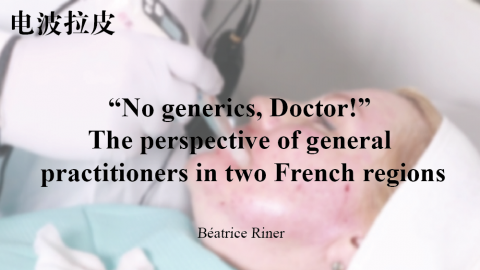
- 3179人
- 分享收藏
“No generics, Doctor!” The perspective of general practitioners in two French regions
简介
【 文献重点摘要 】
Background
Generic medicines are essential to controlling health expenditures. Their market share is still small in France. The discourse and practices of prescribers may play a major role in their use. The purpose of this study was to explore the knowledge, attitudes and practices of general practitioners (GPs) toward generic medicines in two French regions with the lowest penetration rate of these products.
Methods
An observational study was carried out from October 2015 to February 2016 in Guadeloupe and Martinique. The first qualitative phase involved a diversified sample of 14 GPs who underwent semi-structured interviews. The second phase involved a random sample of 316 GPs (response rate = 74%) who were administered a structured questionnaire developed from the results of the first phase.
Results
Seventy-eight percent of the participants defined a generic drug as a drug containing an active substance identical to a brand-name drug, but only 11% considered generic drugs to be equivalent to brand-name drugs, and the same proportion believed that the generic drugs were of doubtful quality. The primary recognized advantage of generic medicines was their lower cost (82%). The main drawbacks cited were the variability of their presentation (44%), the confusion that they caused for some patients (47%), frequent allegations of adverse side effects (37%) and a lack of efficacy (24%), and frequent refusal by patients (26%). Seventy-four percent of the participants stated that they adapted their prescribing practices to the situation, and of this group, 47% prescribed the originator product simply on demand.
Conclusion
Most surveyed GPs were not hostile towards generic medicines. They were caught between the requirements of health insurance regimes and the opposition of numerous users and suggested that the patient information provided by health authorities should be improved and that drug composition and packaging should be made uniform.
Keywords
Primary health care, Drug substitution, Health expenditure, Health behavior
背景
仿制药对于控制医疗费用至关重要。他们在法国的市场份额仍然很小。处方者的话语和实践可能在它们的使用中发挥重要作用。本研究的目的是探索法国两个普及率最低的地区全科医生(GP)对仿制药的知识、态度和行为。
方法
观察研究于2015年10月至2016年2月在瓜德罗普和马提尼克岛进行。第一个定性阶段包括接受半结构化访谈的14名全科医生的多样化样本。第二阶段包括随机抽样的316名全科医生(回复率=74%),他们接受了根据第一阶段的结果制定的结构化问卷。
结果
78%的参与者将仿制药定义为含有与品牌药物相同的活性物质的药物,但只有11%的人认为仿制药与品牌药物等同,同样比例的人认为仿制药质量可疑。仿制药的主要公认优势是成本较低(82%)。被引用的主要缺点是它们的表现多变(44%),它们给一些患者造成的困惑(47%),经常被指控有副作用(37%)和缺乏疗效(24%),以及经常被患者拒绝(26%)。74%的参与者表示,他们调整了自己的处方做法,以适应这种情况,在这一组人中,47%的人只是按需开出创始产品。
结论
大多数接受调查的全科医生对仿制药并不怀有敌意。他们在医疗保险制度的要求和众多用户的反对之间左右为难,建议改进卫生当局提供的患者信息,并统一药品成分和包装。
关键词
初级卫生保健、药物替代、卫生支出、健康行为



